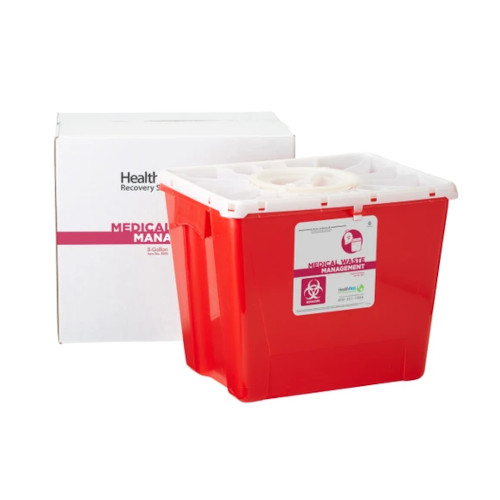Medical Care Health Heroes: The Unsung Duty of Medical Waste Removal Service
Medical Care Health Heroes: The Unsung Duty of Medical Waste Removal Service
Blog Article
The Importance of Correct Garbage Disposal Practices
The administration of waste is a vital aspect of ecological stewardship that frequently goes unnoticed in our lives. Appropriate garbage disposal techniques are not just an issue of benefit however are important for guarding our ecosystems and public health and wellness. From the repercussions of inappropriate waste disposal on our atmosphere to the long-term ramifications for future generations, the significance of taking on sustainable waste administration practices can not be overstated. By checking out the ecological effect of irresponsible waste disposal, the advantages of reusing efforts, and the relevance of community involvement in waste reduction efforts, a much deeper understanding of why appropriate waste disposal methods are crucial emerges.
Ecological Effect of Improper Disposal
Improper disposal of waste poses a considerable hazard to the atmosphere because of its detrimental impacts on ecosystems and human wellness. When waste is not appropriately handled, it can cause air pollution of the air, dirt, and water, creating injury to numerous plant and pet varieties. click here. Chemicals and contaminants from poorly disposed waste can seep into the ground, contaminating groundwater sources and impacting the health and wellness of both wild animals and people
Additionally, the accumulation of waste in garbage dumps creates greenhouse gases like methane, adding to environment modification and worldwide warming. Improper disposal practices also result in littering, which not only deteriorates the aesthetic value of the environment yet can additionally damage wild animals with consumption or complexity.
To reduce these environmental influences, it is vital for individuals and areas to embrace proper garbage disposal techniques such as recycling, composting, and responsible unsafe waste disposal. By taking these actions, we can assist protect ecological communities, preserve natural deposits, and secure human health and wellness for current and future generations.
Advantages of Recycling Programs
Regularly taking part in reusing programs provides numerous advantages for both the environment and culture all at once. One of the vital advantages of recycling is the conservation of natural deposits. By recycling materials such as paper, glass, steel, and plastic, much less raw products need to be removed from the earth, leading to minimized deforestation, mining, and exploration activities. This conservation of resources not just assists in maintaining eco-friendly balance yet additionally contributes to sustainable growth.
Additionally, reusing plays a crucial duty in minimizing power usage and greenhouse gas exhausts. The production of items from recycled products generally needs much less power contrasted to producing from virgin sources - medical waste removal near me. Therefore, the carbon footprint connected with the manufacturing procedure is considerably lowered, assisting in the fight against climate modification
In addition, reusing programs create job chances in the reusing sector, advertising economic growth and social welfare. By motivating the recycling and reuse of products, these programs sustain a circular economic climate that decreases waste generation and makes best use of resource effectiveness, inevitably leading to a cleaner, greener future for generations to come.
Contaminated Materials Monitoring Guidelines
Executing efficient harmful waste monitoring standards is critical for minimizing environmental and health risks connected with the inappropriate disposal of unsafe products - click here. Appropriate handling, treatment, and disposal of contaminated materials are vital to protect against contamination of soil, water sources, and air
One key guideline appertains labeling of hazardous waste containers to guarantee safe handling and transport. In addition, centers have to follow rigorous storage space demands to avoid leakages, spills, or mishaps that can threaten human health and wellness and the setting. Regular training programs for employees on contaminated materials monitoring methods are also essential to ensure compliance with guidelines and promote a society of security.
Moreover, contaminated materials must be segregated based on its buildings to avoid chain reactions that could lead to unsafe situations. Implementing a thorough waste radar can assist monitor the activity of harmful materials from generation to disposal, ensuring openness and responsibility. By following these standards carefully, markets and organizations can add to a much safer and cleaner environment for future and present generations.
Community Participation in Waste Reduction
To properly attend to the environmental and wellness risks related to contaminated materials monitoring, engaging the area in waste reduction campaigns is critical. Area involvement plays a critical role in advertising lasting waste management techniques and fostering a society of environmental obligation. By enlightening locals regarding correct waste segregation, reusing, and composting techniques, neighborhoods can dramatically reduce the amount of waste sent to garbage dumps, thereby reducing ecological air pollution and conserving natural resources.
Neighborhood involvement in waste decrease programs also helps in increasing recognition concerning the importance of waste minimization and encourages people to adopt environment-friendly habits in their every day lives - medical waste removal. Collective initiatives in between local authorities, waste management business, and neighborhood participants can lead to the application of efficient waste reduction techniques tailored to the particular requirements of each area or community
In addition, area engagement fosters a feeling of possession and accountability among residents, equipping them to take aggressive actions in the direction of lowering waste generation and advertising a cleaner, much healthier atmosphere for present and future generations. By functioning together towards common waste reduction objectives, areas can make a substantial effect on reducing the negative impacts of incorrect waste disposal techniques.

Future of Sustainable Waste Practices
Typical waste disposal methods, such as landfilling and incineration, are no longer lasting in the lengthy term due to their significant environmental influences. Moving onward, the future of sustainable waste techniques lies in accepting a round economic climate strategy, where resources are reused, recycled, or repurposed to decrease waste generation.
Technological innovations play a crucial function fit the future of sustainable waste methods. Advanced waste sorting and recycling innovations can assist enhance the effectiveness of waste monitoring processes, enabling the healing of beneficial sources from waste streams. In addition, the fostering of biodegradable materials and composting methods can help in reducing the amount of organic waste ending up in landfills, thereby alleviating greenhouse gas emissions.
Moreover, promoting consumer understanding and education on proper waste segregation and disposal methods is vital for driving behavior change towards sustainability. By cultivating a society of waste reduction, reuse, and recycling, areas can jointly contribute to a cleaner and healthier atmosphere for future generations.

Final Thought
Finally, appropriate garbage disposal practices are important for minimizing environmental influence and promoting sustainability. By carrying out reusing programs, managing contaminated materials properly, and encouraging area involvement in waste reduction initiatives, we can function towards a cleaner and healthier atmosphere. It is very important for individuals, governments, and services to focus on lasting waste techniques for the future well-being of our earth.

From the repercussions of incorrect waste disposal on our environment to the long-lasting effects for future generations, the relevance of embracing sustainable waste administration practices can not be overstated. By exploring the environmental impact of careless waste disposal, the advantages of navigate to this site recycling initiatives, and the relevance of area involvement in waste reduction initiatives, a deeper understanding of why proper waste disposal practices are essential arises.
By enlightening citizens regarding proper waste segregation, recycling, and composting methods, neighborhoods can considerably reduce the quantity of waste sent to landfills, therefore lessening environmental pollution and saving natural sources. (click here)
Relocating forward, the future of lasting waste methods exists in embracing a round economic situation method, where resources are reused, recycled, or repurposed to decrease waste generation.
Advanced waste sorting and reusing modern technologies can aid improve the efficiency of waste monitoring procedures, permitting for the recovery of important resources from waste streams.
Report this page